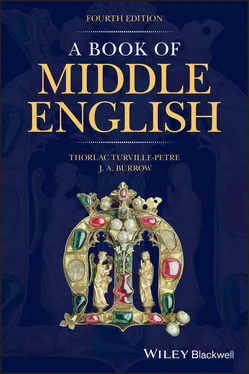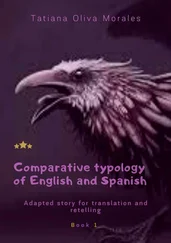As the distinctions between the subjunctive and the indicative forms – always only partial – were reduced, the subjunctive mood came more and more to be expressed by other means, in particular by the use of the modal auxiliaries such as shall and sholde , may and miʒt , will and wolde . Modern English has, of course, developed further along the same lines. In Middle English the modal auxiliaries are quite often found as equivalents to the subjunctive, e.g. in an indirect question: to spyr uschon oþir / Quat body hit myʒt be , ‘each one to ask the other what body it might be’, 11/93–4.
The imperative generally has distinct forms for singular (addressed to one person) and plural; see 4.5.2. It can also be expressed by do with another imperative, as in do gyf glory to þy godde , 8/204. Another common way of giving an order is with imperative look followed by the subjunctive: loke þou drynke , 7b/277; loke þee loþe , ‘make sure that you find it hateful’, 6/4 (see note there).
Some verbs which have a personal subject in Modern English, such as ‘I like’, are impersonal in Middle English, with it as subject and me etc. as dative object: it likes me . Quite regularly the dative object precedes the verb and the subject it is not expressed: me lykes / þat I schal fange , ‘it is pleasing to me/I’m glad that I shall receive’, 9/390–1. Another common impersonal verb with the same meaning is list ; such constructions may need to be paraphrased rather than translated word for word: me luste bet speten , ‘it pleases me better to spit’, so ‘I’d rather spit’, 2/39; ne lust him nu to none unrede; / Nu him ne lust na more pleie , ‘nor is he attracted now to any evil counsel, nor does he like fooling around any more’, 2/212–13. Hunger , ‘be hungry’, fall , ‘happen’, need , ‘be necessary’, and reche , ‘care’, are some other common verbs that may be used impersonally: ow (dative) schal eaver hungrin , ‘you’ll always go hungry’, 4/64–5; hym neded no gyde , ‘no guide was necessary to him’, 18a/166; me no reche , ‘I don’t care’, 5/342.
The verb think is derived from two Old English verbs, þencan , ‘to think’, and þyncan , ‘to seem’. The two are still distinguished as þenk and þynk in the Gawain manuscript: þenk wel, Sir Gawan , 9/487; what maystery þe þynkez , ‘what accomplishment does it seem to you’, 8/482. In the line þenne byþenk þe, mon, if þe forþynk sore , 8/495, the first verb (OE biþencan ) means ‘consider’ and has a reflexive pronoun þe ; the second has an impersonal construction (and is subjunctive after if ), ‘if it upsets you’. In me thynkes / Hom burde , ‘it seems to me they ought to’, 11/259–60, there are two impersonal verbs together.
Some adjectives governing the dative have similar impersonal constructions: lever me were , ‘I should rather’, 5/177; me is þe wurs , ‘it is the worse for me’, 2/34; þe is bettere , 14j/23; wel is me , 14q/17; hou wo þe beet , ‘how great is your grief ’, 14p/18.
Intransitive verbs expressing movement, fare , go , turn and the like, are often accompanied by a reflexive pronoun: Jonas hym ʒede , ‘Jonah went’, 8/355; Childric … gon him to charren / And beh him over Avene , ‘Childric … turned back and made his way over the Avon’, 3/78–9. The infinitive verb of motion is often not expressed after an auxiliary verb: and wold up and owy , ‘and wanted (to get) up and (to go) away’, 5/96; þider ichil (the pronoun ich run together with the verb wil ), ‘I’ll (go) there’, 5/316; I wyl me sum oþer waye , ‘I’ll go some other way’, 8/86 (where the reflexive pronoun remains). In Ticius to Tuskan , 9/11, the verb of motion has to be understood from the context even without an auxiliary verb.
The passive is most often expressed by the verb be : he … wæs wæl underfangen fram þe pape Eugenie , ‘he was well received by Pope Eugenius’, 1/63. Until the end of the fourteenth century it was also expressed by worthe , ‘to be, come to be’, particularly in a future sense: blessid þou worth , ‘may you be blessed’, 11/340; þou worst wiþ ous yborn , ‘you shall be carried off with us’, 5/174.
Only one verb, hoten , has a passive form, hat(te) , ‘is called’ or ‘was called’: as hit now hat , ‘as it is now called’, 9/10. Increasingly hiʒte , in origin the active past tense, was used in a passive sense: his sone hihte , ‘his son was called’, 7b/82.
The indefinite pronoun man was frequently used where Modern English uses a passive construction; see 5.4.3.
In earlier texts the usual way of negating a verb was to place ne (or no / na ) immediately in front of it, and indeed this practice continued throughout the period: I ne can ne I ne mai , ‘I do not know how to nor am I able to’, 1/33; ne wonde / þis aventure for to frayn , ‘don’t hesitate to attempt this adventure’, 9/488–9. Ne was run together with have , wil and parts of be beginning with a vowel or w‐ : e.g. nadde , nil , nis , nere (4.5.7–8).
Ne could be reinforced by another negative word elsewhere in the sentence. The commonest was nouʒt , originally a noun meaning ‘nought’ or ‘nothing’, which developed into the adverb not : he no schuld nouʒt fram hem go , ‘he would not go from them’, 5/225; with the subject following the verb: ne reche ich noʒt , ‘I don’t care’, 2/58; with noʒt modifying another adverb, wel : his nest noʒt wel he ne bihedde , ‘he did not guard his nest well’, 2/102.
From the fourteenth century it became common to negate the verb with not alone, usually following the verb: I know not þe , ‘I don’t know you’, 9/400; Arthure wolde not ete , 9/85. In verse, where word‐order is more flexible, bringing noʒt forward gives it additional emphasis: þat noʒt hit yow falles , ‘that it is not fitting for you’, 9/358. The modern construction with auxiliary ‘do not’ was not fully established until the seventeenth century.
The notions that multiple negation, as in ‘he ain’t been nowhere’, is substandard, and that ‘two negatives make a positive’, have no historical basis. In Middle English piling up of negatives is very common, and its purpose is to reinforce the negative. Notable examples are: never him nas wers for noþing , ‘he was never more distressed about anything’, 5/98; ne isæh nævere na man selere cniht nenne , ‘no‐one had ever seen a better knight’, 3/28.
In direct questions the subject follows the verb, whether or not an interrogative word such as ‘why’ or ‘what’ is used: how schal I do? , 6/102; can thow serven? , 7a/12; whi seist þou so? , 14j/25. The modern use of do as an auxiliary in questions is unusual even at the end of the period; compare quotation with translation here: wenst þu þat ich ne cunne singe? , ‘do you think that I can’t sing?’, 2/47.
Читать дальше












